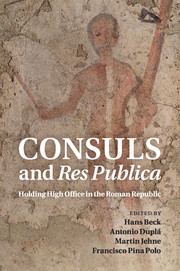Book contents
- Frontmatter
- Contents
- Preface
- Contributors
- The republic and its highest office: some introductory remarks on the Roman consulate
- Part I The creation of the consulship
- Part II Powers and functions of the consulship
- Part III Symbols, models, self-representation
- Part IV Ideology, confrontation and the end of the republican consulship
- Chapter 12 Consular appeals to the army in 88 and 87: the locus of legitimacy in late-republican Rome
- Chapter 13 Consules populares
- Chapter 14 The consulship of 78 bc. Catulus versus Lepidus: an optimates versus populares affair
- Chapter 15 Consulship and consuls under Augustus
- Bibliography
- Index of persons
- Subject index
Chapter 12 - Consular appeals to the army in 88 and 87: the locus of legitimacy in late-republican Rome
from Part IV - Ideology, confrontation and the end of the republican consulship
Published online by Cambridge University Press: 07 September 2011
- Frontmatter
- Contents
- Preface
- Contributors
- The republic and its highest office: some introductory remarks on the Roman consulate
- Part I The creation of the consulship
- Part II Powers and functions of the consulship
- Part III Symbols, models, self-representation
- Part IV Ideology, confrontation and the end of the republican consulship
- Chapter 12 Consular appeals to the army in 88 and 87: the locus of legitimacy in late-republican Rome
- Chapter 13 Consules populares
- Chapter 14 The consulship of 78 bc. Catulus versus Lepidus: an optimates versus populares affair
- Chapter 15 Consulship and consuls under Augustus
- Bibliography
- Index of persons
- Subject index
Summary
In mid-March of 49, Cicero was in anguish over what to do now that Pompey had crossed to Greece and Caesar was pressing him for support or at least neutrality. His personal obligation to Pompey weighed heavily with him, he writes, but on the other hand he represents joining Pompey as committing himself to fight a civil war with Sullan vindictiveness and ferocity. From Formiae he writes to Atticus on March 18 that he was deterred from joining Pompey above all by “the kind of war intended, savage and vast beyond what men yet see.” It is interesting that for Cicero at this point it is Pompey, not Caesar, who is the Sullan counterpart: Sulla potuit, ego non potero? Cicero then runs through some historical precedents, which he ultimately rejects – those of Tarquin, Coriolanus and the Athenian Hippias – and one that he embraces: that of Themistocles, according to the tradition that made him commit suicide in order not to join the Great King's war against his country. He proceeds: “But you may object that Sulla, or Marius, or Cinna acted rightly. Yes, justifiably, perhaps (immo iure fortasse); but once victorious, they were unequalled in cruelty and slaughter.” Cicero goes on to reject this kind of war quite forcefully, especially since Pompey and his friends were preparing (he claims) to surpass even those bloody precedents in savagery.
Cicero's imaginary interlocutor's objection – that “Sulla, or Marius, or Cinna acted rightly” – and his response – “yes, justifiably, perhaps,” while drawing an implied distinction between their behavior before and in victory – should pique our interest. Evidently he did not put Sulla, Marius and Cinna in quite the same category as Coriolanus, Tarquin or Hippias. He concedes that they may be seen as having had justice on their side, although their actions were deeply tainted by the use they made of victory. But this nuanced point of view is a far cry from the nearly unanimous chorus of disapproval raised in modern scholarship against these men's decisions to take up arms against what is frequently, but tendentiously, referred to as “the state.” In this usage, however, “the state” is not a neutral description of a particular locus of governmental authority, but a normative one that presupposes legitimacy – and that is precisely what was contested by Sulla in 88 (and 83–82), by Marius and Cinna in 87 (as well as Caesar in 49).
- Type
- Chapter
- Information
- Consuls and Res PublicaHolding High Office in the Roman Republic, pp. 259 - 278Publisher: Cambridge University PressPrint publication year: 2011
- 5
- Cited by



